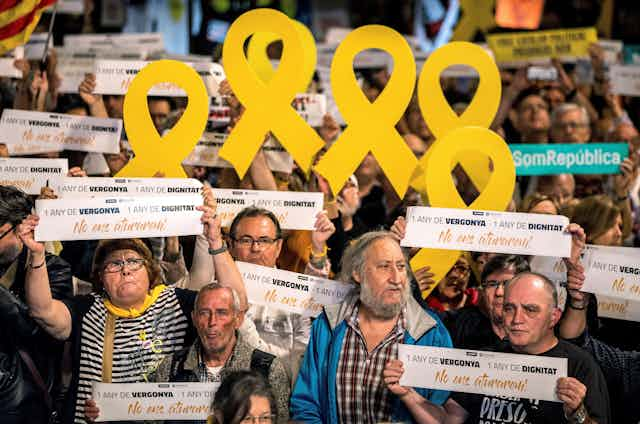After an unofficial referendum in October 2017, the pro-independence political parties in the Catalan parliament unilaterally declared independence from Spain. In response, the Spanish government invoked Article 155 of the Spanish Constitution which effectively suspended the region’s autonomy.
More than a year on from these events, ousted Catalan leader Carles Puigdemont remains in exile in Belgium. Another six pro-independence leaders remain in exile, including Clara Ponsati, former education minister in the Catalan government who has returned to her employment as an economics professor at the University of St Andrews, in Scotland. Although not formally charged, like the other exiled leaders, were she to return to Spain she would likely be arrested on charges of rebellion and misuse of public funds. She has been critical of Europe’s leaders for their silence on the Catalan question and has claimed that Catalan political prisoners are being used as pawns to deactivate the pro-independence movement.
Two activists and seven politicians remain in custody. They have been charged by Spain’s attorney general with rebellion and misuse of public funds. This ignores an earlier decision by Spain’s solicitor general, who recently downgraded the charge of rebellion to sedition because the former charge requires the use of violence. The available evidence suggests that violence was not used by any of those in jail. Nevertheless, if the attorney general continues his hardline stance, those in jail could face up to 25 years behind bars. Many will be surprised to hear that Spain’s legal system allows people to be held on precautionary, pre-trial detention for such a long time.
The group facing charges of rebellion includes two civil society activists Jordi Sanchez, president of the campaign group Catalan National Assembly (ANC), and Jordi Cuixart, president of the campaign group Omnium Cultural. Both are facing up to 17 years in jail. Both have been detained since October 2017 in connection with protests in Barcelona on September 20 and 21 that year. The protests were aimed at obstructing police raids to seize material related to the referendum from Catalan government buildings.
Yet Amnesty International’s director in Europe, Gauri Van Gulik, noted that “although calling protests to obstruct legitimate police operations can – if proof is produced of their commission – constitute a public order offence, it does not constitute a serious crime such as sedition or rebellion”. Amnesty has called for the immediate release of the “two Jordis”, as they have become known across Catalonia.
Amnesty avoids using the term “political prisoner” as there is no accepted definition in international law. However, over 1,000 legal experts have signed a manifesto arguing that the Catalan leaders in jail are effectively that. They say the accused have not been given time to prepare their defence, making a farce of the legal proceedings. Similarly, 53.4% of Catalans consider that those in jail are political prisoners. And 60% feel that the judicial proceedings against them are unjustified. It’s worth noting that that’s a higher percentage than the estimated number of Catalans who support independence.

Others, connected with the Committees for the Defence of the Republic – groups campaigning for the unofficial referendum result to be upheld – were charged with public disorder offences following a protest in Barcelona on February 23 2018. They could face two and a half years in prison.
In their resistance to the Spanish authorities, Catalans are drawing on a long tradition. Today’s political prisoners, whether accurately labelled or not, are the latest in a long line who have fought against the perceived injustices of the Spanish state. Foremost among these is Lluis Companys, the president of the generalitat who was arrested for declaring the Catalan republic on October 6 1934 and was executed by firing squad on October 15 1940. The historic parallel is not lost on the Catalan people. Nor it seems was the parallel lost on the right-wing Popular Party’s spokesperson, Pablo Casado, who threatened Puigdemont, ahead of the unilateral declaration of independence, with the same fate as Companys.
Spain’s Supreme Court has ordered that 18 former Catalan leaders stand trial for their role in the unilateral declaration of independence in 2017. The charges against them include rebellion, sedition, the misuse of public funds and disobedience. The trial is likely to take place in early 2019.
The issue of Catalan independence will not be solved by judicial actions. Politics is required. Pedro Sanchez, the socialist prime minister, has certainly taken a softer line than his predecessor, Mariano Rajoy. Nevertheless, the political negotiations necessary to solve the crisis will require a stronger government than the current minority socialist administration. It will also require the Catalan pro-independence parties to present a more united front than is currently the case. And ultimately, it will be hard to have any meaningful negotiations while there are political prisoners. Carla Ponsati’s lawyer in Scotland, Aamer Anwar, has said that ‘Talking to Spain now is like sitting down with a gangster holding hostages’. A long road lies ahead.

